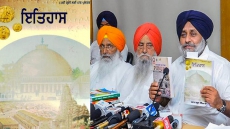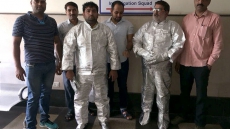There's only one year more to go for the BJP-led regime before another test at the hustings. But is the country any nearer to Prime Minister Narendra Modi's promised 'acche din' (good days)?
Four years ago, the country had voted the present regime to power on hopes of better days in all socio-economic-political spheres. But despite some strong structural reforms like GST, and gut-wrenching changes like demonetisation, the jury may still be out on how good it has been, according to economists and others experts.
Despite India's GDP growth of 7.2 per cent in the third quarter (October-December) of 2017-18, some economists feel that the demonetisation drive, avowedly taken to "cleanse the system" of black money, had ended up damaging the country's economy instead.
"Demonetisation was a terrible mistake by the government, for which the common people paid the price. It has reduced people's trust in the banking system, as they were denied their own money during the period of cash crunch. It takes so much time and work to build institutions and policies -- it is so much easier and faster to break things," Jayati Ghosh, Economics Professor at Jawaharlal Nehru University (JNU), told IANS.

The government decided to ban 1,000 rupee and 500-rupee notes on November 8, 2016, taking away 86 per cent of the total currency in circulation. "May be this move had served the government's purpose politically, but economically it was a bad one," Ghosh added.
Echoing similar views, Arun Kumar, former professor of economics at the JNU, told IANS that when the NDA government came in, the Indian economy was already on an upward trajectory. The quarter, in which the government took over, the growth climbed to eight per cent. In October 2016, India was the fastest growing economy in the world when China slowed down a bit.
"But then the government administered a shock to the system with demonetisation. It had a negative impact on the unorganised sector that comprise 45 per cent of production and 93 per cent of employment in the country. According to some estimation, 50-80 per cent of that got damaged," he said.

Kumar, who is now Chair-Professor with the Institute of Social Sciences, added: "Government did no survey at that time and hence no data is available. Even data from International Monetary Fund and World Bank, which rely on government data, do not show any estimates (on impact)."
After demonetisation, credit off-take in the country declined sharply. "Between November-December 2016, it was at historic low of 60 years. Investment into the country also took a big hit," he said.
However, Ranen Banerjee, Partner & Leader, Public Finance and Economics, at PricewaterhouseCoopers (PwC) has a different take on some of the benefits flowing from the action.
"Demonetisation had positive impact as far as digital payments were concerned. It shot up sharply during that period but came down subsequently. The level is still higher earlier. But demonetisation as a measure did not deliver all the results that it was supposed to deliver," Banerjee said.

The government's other major thrust, though, on Goods and Services Tax (GST) -- rolled out on July 1 last year, got better billing. Economists are hopeful that it will bring in beneficial changes once the hiccups are over. Banerjee says GST would change the entire landscape of tax compliance in the country by creating a multiplier effect. "GST was a bold move which is showing positive results," he added.
Ghosh, though, thinks GST goes against the grain of federalism. "A unified system is not so necessary in a federal structure -- for example, the US does not have it and still has a very modern economy. In a federal structure you have to allow states to have some money raising power. Further, GST implementation has been really bad."
Kumar said: "Introduction of GST has hit the unorganised sector badly. Even in Malaysia where GST was introduced in 2015-16 at 26 per cent, government decided to scrap it. The organised sector is rising at the expense of unorganised sector. Disparity is rising."

Industry chambers have by and large welcomed government initiatives, especially the decision on GST. "The overall economy is strong with GST having settled down and reforms firmly on the right path," Chandrajit Banerjee, Director-General of Confederation of Indian Industries (CII), told IANS.
Over the last four years, according to him, the government had systematically addressed major "pain points" for the economy such as ease of doing business, non-performing assets of banks, foreign direct investment rules, infrastructure construction and exit of failing enterprises.
"The government's mission-mode development campaigns have delivered notable results, adding to overall growth multipliers. The firm level and sectoral level numbers look promising for the next year in terms of orders booked and capacity utilisation," said CII's Banerjee.
Former economics professor at Indian Statistical Institute, Dipankar Dasgupta, who holds that the economy was yet to recover from the hit it took because of demonetisation, says that on GST he was hopeful that with time it will stabilise. "In the other countries where it was introduced there were teething problems too," he said.

The government also took up the job to cleanse bad loans of banks. It is pumping in Rs 2.11 lakh crore as capitalisation, spread over two years. But a number of banking scandals and rising non-performing assets (NPA) may have reduced the faith of people in the bank system, after the shock of demonetisation. "We have declining deposits in the banking system due to people's rising mistrust," says Ghosh. Dasgupta says recapitalisation should be followed with caution so that it does not widen the fiscal deficit.
The government, though, has got support in its effort to tackle the issue of NPAs. The bankruptcy law has put everyone on notice. "People are taking the issue of NPAs seriously trying to resolve it. Companies are opting for out of court settlement. Propensity to comply has increased as borrowers know that there will be consequences on not servicing a loan," Banerjee of PriceWaterhouseCoopers said.
Yet, overall the promise of the golden pot at the end of the five-year rainbow, as promised by Modi in his of speeches -- where he had painted the BJP rule in attractive hues -- has not materialised in four years. BJP's best salesman may have oversold the hope.

"I do not blame this government for not being able to deliver 'achhe din'. Which government since Independence has?" asks Dasgupta rhetorically.




